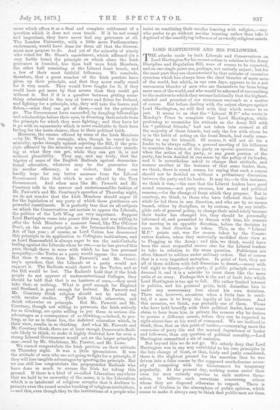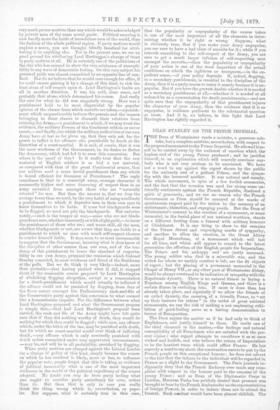LORD HARTINGTON AND HIS FOLLOWERS.
THE attacks made by both Liberals and Conservatives on Lord Hartington for his recent action in relation to the Army Discipline and Regulation Bill, were of course to be expected, and on one single point are, perhaps, not entirely unjust ; but for the most part they are characterised by that mistake of excessive cynicism which has always been the chief blunder of -mere men. of the world, but which, in our own days, appears to be a not uncommon blunder of men who are themselves far from being mere men of the world, and who would be ashamed of succumbing to the motives to which they assume habitually that the highest- minded and proudest of our statesmen succumb as a matter of course. But before dealing with the unjust charges against Lord Hartington, we will deal with that which seems to us just. It seems to us that the "Liberal M.P." who wrote in Monday's Times to complain that Lord Hartington, while professing to reconsider his attitude on the Army Bill with. his "political friends," had not taken into counsel at all the majority of those friends, but only the few with whom he is in the habit of acting on the front Bench, had really some- thing to say for himself. Of course, it will not do for a leader to be always calling a general 'meeting of his followers to consider the action of the party on special questions. But when the action of the party, or any great portion of the party, has been decided in one sense by the policy of its leader, and it is nevertheless asked to change that attitude, and assume another at the instance of that same leader, then, we think, there is sound reason for saying that such a course should not be decided on without a preliminary discussion between the party and its leader. It may be,—in this instance, we think it was,—the ease that the Liberal leaders have good sound reasons,—not party reasons, but moral and political reasons,—for the change of front which they propose. But in courtesy, we think, to those who have followed their leader while he led them in one direction, and who are by no means bound, either by discipline, or by custom, or by any intelli- gible rule of general policy, to change their mind solely because their leader has changed his, they should be personally informed of, and permitted to discuss with him, his reasons for moving in an opposite direction, before the decision to move in that direction is taken. This, as the " Liberal M.P." points out, was the course taken by the Conser- vative leaders, when they materially modified their view as to Flogging in the Army ; and this, we think, would have boon the most respectful course also for the Liberal leaders to take in relation to the same question. Politicians are often likened to soldiers under military orders. But of course that is a very imperfect metaphor. In point of fact, they are all of them soldiers with full discretion to desert,—many with full right to desert,—their party, if public principle seems to demand it, and it is a mistake to treat them like the mere units of an army. Perhaps this is the sort of fault into which Lord Hartington is too apt to fall. His rather limited interest in politics and his personal pride, both disincline him to make any unnecessary fuss about his own decisions. There are, however, occasions when a little fuss is need- ful, if a man is to keep the loyalty of his followers. And this occasion, we think, was probably one of thorn. Those who have held heartily with their political leader, have some claim to hear from him in private the reasons why he desirea to pursue a different course, before they can be expected to right-about-face at his word of command. We are inclined to think, then, that on this point of tactics,—concerning more the courtesies of party life and the mutual dependence of leader and followers, than any question of political morality,—Lord Hartington committed a sin of omission. But beyond this we do not go. We utterly deny that Lord Hartington was in any way unfaithful to his own principles in the late change of front, or that, fairly and justly considered, there is the slightest ground for the assertion that he was driven into a false course by the supposed unwholesome neces- sity of competing with the Government for temporary popularity. At the present day, nothing seems easier than even for men entirely superior to such motives them- selves, to believe such assertions concerning others whom they are disposed otherwise to respect. There is a sort of fatalism in the atmosphere of public opinion, which seems to make it always easy to think that public men act from. very much poorer motives than any which would be acknowledged by private men of the same moral grade. Political sneering is now hardly more the habit of incredulous men of the world, than the fashion of the whole political region. If party motives would explain a move, you are thought blindly fanatical for attri- buting it to anything else. Yet in the present case, we see no good ground for attributing Lord Hartingion's change of front to party motives at all. He is certainly one of the politicians of the day who has seemed to show the very minimum of suscepti- bility to any wave of democratic feeling. On this very subject his personal pride was almost committed to an opposite line of con- 'duct. Nor do we believe that he would care enough for office, if he could ensure gaining it by a change of this kind, to risk the least atom of self-respect upon it. Lord Hartington's faults are all in another direction. It was his cold, clear sense, and probably that alone, which determined his course. And really the case for what he did was singularly strong. Here was a punishment held to be most disgraceful by the popular opinion of the classes from which recruits are taken,—apunish- ment which unquestionably induces the parents and the women belonging to these classes to dissuade their relatives from entering the Army,—a punishment to which, if we may trust the evidence, the military Powers of the Continent seldom or never resort,—and finally, one which the military authorities of our own Army have at last so far given up, that they only ask for the power to inflict it for offences also punishable by death at the discretion of a court-martial. It is said, of course, that it was the mere weakness of the Government, in its desire to flatter the democracy, which had led it to even this concession. But where is the proof of this ? Is it really true that the raw material of English soldiers is so bad a raw material, as compared with that of the great Continental armies, that our soldiers need a more brutal punishment than any which is found efficient for Germans or Frenchmen ? The reply sometimes is that in a conscript army, average character is necessarily higher and more deserving of respect than in an army recruited from amongst those who are "naturally selected" for war. But then the answer is, that we keep the average lower than we need, by the very habit of using needlessly a punishment to which it degrades men in their own eyes to know themselves to be liable. If none but blackguards were to be flogged, we need not pity the blackguards. But unfortu- nately,—such is the temper of war,—some who are not black- guards are sure, whether innocently or with slight guilt,—to incur the punishment of those who are ; and worse still, all the men, whether blackguards or not, are aware that they are liable to a punishment to which no man with much self-respect chooses
to render himself liable: It does seem to us most unreasonable
to suppose that the Government, knowing what it does know of the discipline of other armies than our own, and of the ten- dency of this punishment to lower the standard of respecta- bility in our own Army, proposed the remission which Colonel ,Stanley conceded, in mere weakness and dread of the Residuum at the polls. But we do think it very likely—indeed, more than probable—that having yielded what it did, it stopped short of the reasonable course proposed by Lord Hartington of abolishing flogging altogether, except as a commutation for a death-punishment which would actually be inflicted if the offence could not be punished by flogging, from fear of the fierce outcry amongst the Parliamentary rank-and-file of the Conservative party against this concession to what seemed like a humanitarian impulse. For the difference between what Lord Hartington proposed and what the Government propose is simply this,—that had Lord Hartington's proposal been carried, the rank and file of the Army might have felt quite sure that if they did nothing worthy of death, they would do nothing for which they could be flogged ; while now, any offence which, under the letter of the law, may be punished with death, but for which no court-martial would ever think of inflicting death,—any offence which is only nominally punished with death unless committed under very aggravated circumstances, —may be, and will be in all probability, punished by flogging. When party motives are charged against the Liberal Leader for a change of policy of this kind, simply because the course on which he has resolved is likely, more or less, to influence the popular vote, people forget that this is taking as evidence of political immorality what is one of the most important evidences in the world of the political expediency of the course adopted. No doubt you may do from party feeling what you ought to sacrifice party ascendancy for ever, rather than do. But then that is only in case you really think the thing wrong which is, nevertheless, so popu- lar. But suppose, what is certainly true in this ease, that the popularity or unpopularity of the course taken is one of the most important of all the elements in deter- mining whether it be right or wrong. Suppose, what is obviously true, that if you make your Army unpopular, you are sure to have a bad class of recruits for it ; while if you concede something to the self-respect of the Army, you are sure to get a much larger infusion of self-respecting men amongst the recruits,—then the popularity or unpopularity of your action is one of the most important of the actual conditions on which the rightness or wrongness,—in the ex- pedient sense,—of your policy depends. If, indeed, flogging, as a secondary punishment, is essential to the discipline of the Army, then it is a party course to resist it merely because it is un- popular. But if you have the gravest doubts whether it is needed as a secondary punishment at all,—whether it is needed at all unless it be as a commutation for death-punishments,—and are quite sure that the unpopularity of that punishment injures the character of your Army, then the evidence that it is so unpopular, is evidence pertinent to the substantial question at issue. And it is, we believe, in this light that Lord Hartington has rightly regarded it.



































 Previous page
Previous page